#Alan Plater
Explore tagged Tumblr posts
Text
"Oliver's Travels" (1995)

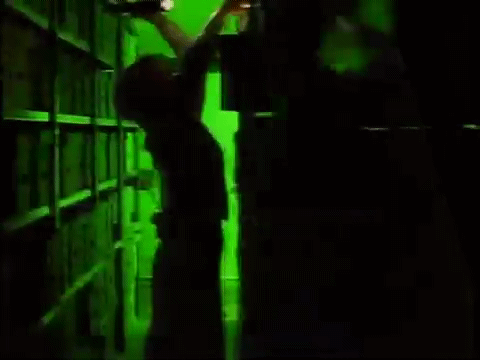


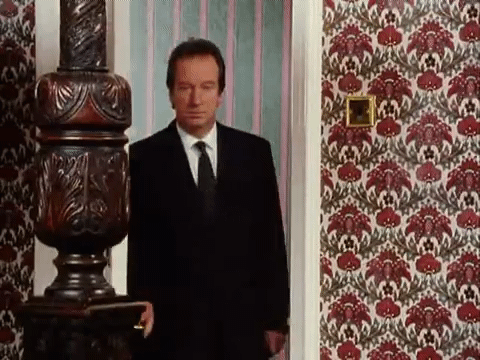




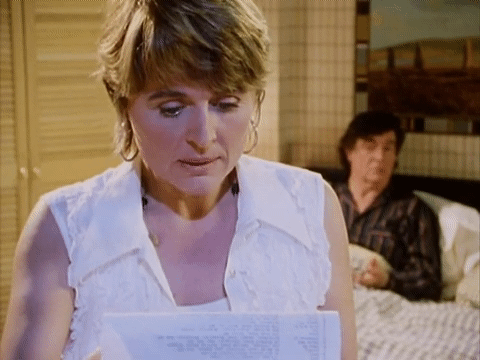
Films and series I've watched in 2023 (9/?)
Full series (5 episodes. The picture quality isn't the best but if you can get past that it's very well worth a watch):
#series watched in 2023#Oliver's Travels#Alan Bates#Sinéad Cusack#Bill Paterson#Giles Foster#Alan Plater#light noir#miniseries#crime
6 notes
·
View notes
Text
How to tell you’re in an Alan Plater television programme:
Average Joe Englishman, seemingly unremarkable hero, often a northerner
slow-moving plot
the Forest of Arden is mentioned
soft jazz is always involved
football
Dad Jokes/witty comments
strong women who don’t take BS
the setting involves academic life/a polytechnic/a high school
a yellow car/station wagon
a mystery plot unraveling through a series of random things that irritate and intrigue the main protagonists
police corruption and/or incompetence
2 notes
·
View notes
Text
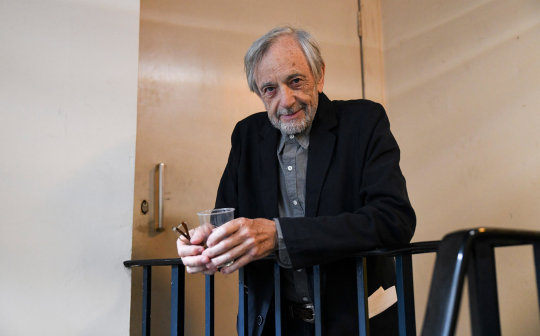
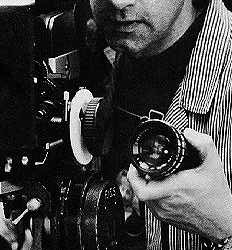

Happy Birthday Bill Forsyth the Scottish film director and screenwriter.
Born in Glasgow July 29th 1946 and educated at Knightswood School. On leaving aged 17, he answered an advertisement for a “Lad required for film company” and spent the next eight years helping make short documentary films.
Leaving documentary production in 1977, Forsyth wrote the scripts for Gregory’s Girl and That Sinking Feeling in the hope of breaking into feature films.
Obtaining finance, however, proved frustrating and problematic. The BFI Production Board rejected Gregory’s Girl three times. Forsyth later said, “I remember one torment of a meeting when I tried to explain that Gregory’s Girl was really a structuralist comedy… I suspect my script was too conventional although nobody actually told me as much.”.
That Sinking Feeling was eventually made in 1979 with amateur actors from the Glasgow Youth Theatre, including John Gordon Sinclair (who later took the lead in Gregory’s Girl , its tiny £5,000 budget was raised from a variety of sources.
Forsyth’s distinctive voice as writer-director is already apparent in this tale of a robbery of stainless steel sinks by a gang of unemployed Glasgow teenagers - intensely humanistic and humorous yet with an underlying seriousness of purpose. This ability to create a self-contained yet believable world with a keen sense of the absurd and bizarre in the everyday is perhaps only rivalled by the work of British television writer Alan Plater. The film opened to great popular and critical success at the Edinburgh and London Film Festivals but was unable to secure more widespread distribution.
Gregory’s Girl was Forsyth’s breakthrough film. This acutely observed story of adolescence and first love set in a Scottish new town was rapturously received by both critics and public alike. Forsyth’s reputation seemed to be secured by the success of his next venture, Local Hero, a first collaboration with producer David Puttnam.
In 1999 he made Gregory’s Two Girls as a sequel to Gregory’s Girl, with John Gordon Sinclair playing the same character, but it received mixed reviews.
Gregory's Girl, to me, is still a very funny film, but it feels dated, that's not to say that it hasn't stood the test of time with some folk, indeed The Glasgow Film Theatre (GFT) showed a 4k version of the 1980 cult classic last August 1which was followed by a Q&A session with some of the cast including Gordon Sinclair(Gregory), Clare Grogan.
In 2022 the popular Scottish actor Peter Capaldi spoke of how Bill Forsyth saved him from living off pakora and lager after featuring him in Local Hero. The Doctor Who and The Thick Of It star praised the Scots film director in an acceptance speech after receiving a Bafta Scotland Award for Outstanding Contribution to Film & Television.
I love Capaldi's affection for our country, speaking to the audience while holding his Bafta, Capaldi said the award was “for getting lucky, and for being lucky enough to be born in Scotland”.
He said: “Forty years ago I was just up here (in Glasgow) as an art student, living off pakora and lager for breakfast.
“Bill Forsyth scooped me up and put me in Local Hero.
“It was an act of kindness and confidence that baffled me and much of the industry to this day, but I wouldn’t be here without him and nor would a lot of others.”
Capaldi landed this breakthrough film role aged 24 playing Danny Oldsen, a naive young oil industry executive, in the film.
A number of actors, including Dee Hepburn, will be a part of a celebration of the films of Bill Forsyth at the Outwith Festival of music and arts which takes place in Dunfermline from September 3-8. It will also screen That Sinking Feeling and Local Hero at the city’s Carnegie Theatre.
16 notes
·
View notes
Text
Phone Call [Duzzy]
warnings: sight smut, mainly just teasing
BRIIING! BRIIIING! BRIIIIIIING!
Duff hopped up to answer the phone. "Hello?.....oh hey alan........ no im not busy........."
Izzy saw this as the perfect oprotunity, being to horny bastard he is, he made his way to duff. Izzy plopped down next to duff with a shit eating grin platered on his face. He pushed duffs brown/ blond hair aside revealing his pale neck.
Duff lifted the reciver away from from his face 'stop' he tried to whisper but it came out more of a whine.
Izzy simply shook his head and continued down to his collar bones sucking light pink brusies in contrast to his almost white skin. Izzy proudly listened to duffs breath shake and watched him bite his lip to hold back moans. But no, no, no this wasnt enough for izzy. He wanted to see his lover completely give into his touch and he was close but no quite there, yet. Doing the next most effective thing izzy lowered his hand down duffs chest still kissing and biting on his neck. He moved his hand down until he hit the goldmine- duff's hard on. He gave it a good squeeze before palming him. Meanwhile izzy had let go of duffs neck and lowered himself onto his knees, licking duffs chlothed erection, earning a low moan from the taller male.
"you know what, alan? Maybe now is a bad time...." duff whimpered
"Okay...well you two have a good time and tell izzy i said hi." Alan responded so noschlontly. Duff and izzy both blushed hard as duff hung up the phone.
"You asked for this you little shit." Diff sneered now taking control of the situation, pushing Izzy into their shared bedroom.
13 notes
·
View notes
Text

Inspired by @robbielewis and his brilliant ongoing series featuring a pictorial history of the Northeast, this is the first in an occasional series of posts on film, theatre and television luminaries with a strong personal or professional link with Northeast England, beginning with John Nightingale.
There doesn't appear to be a great deal of information available; he was apparently born in Burnley, Lancashire, in 1942, and attended St Cuthbert’s College, Durham University. He also spent several years with the National Youth Theatre, and while with the NYT made his television debut, which was noted by the Durham University paper, Palatinate, in 1964.

John Nightingale's highest profile role was in the BBC’s When the Boat Comes In, a gritty social and political drama set during the years after the Great War in the struggling Tyneside community of Gallowshields. Appearing in 39 episodes over 1976 and 77, he played the troubled but likeable Tom Seaton. It was a standout performance in the company of some very fine actors, including James Bolam, Susan Jameson, Edward Wilson, Jean Heywood, James Garbutt, Malcolm Terris, Ian Cullen, Madelaine Newton and Michelle Newell.
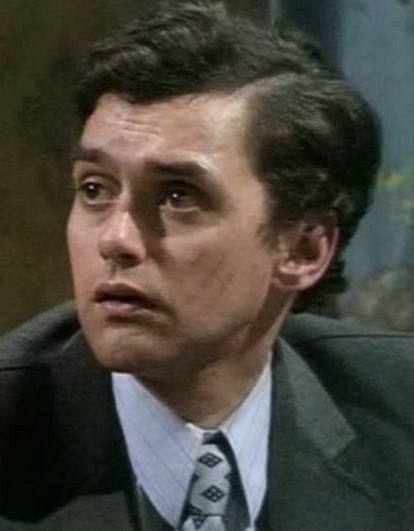
John Nightingale’s other television credits include appearances in Crown Court, in three episodes of Alan Plater’s dramatisation of the AJ Cronin novel, The Stars Look Down, the epic drama-documentary Fall of Eagles, and the Thames political drama, Bill Brand, as well as a handful of appearances in BBC television plays.
He passed away in 1980, aged just 37, from cancer. His challenging role in When the Boat Comes In demonstrated that he was one of the most gifted actors of his generation, and makes you wonder just what he could have achieved given the chance of a long life and career.
Thanks (again) to @robbielewis for a little additional history of Durham University.
#social history#working class history#british actors#british television#british theatre#national youth theatre#actors of the northeast#northeast england#durham university
8 notes
·
View notes
Text

Working in a back ground. I want to create a form that represents a metaphysical feel to my work. I was really thinking about material. I looked back at the first series of experiments we did in yr3 with Lorna. I was looking at how we made paper forms and thought paper as a good choice of material. it can be bent, cut to shape and coloured to suit the work well. I bought some A1 card from the college art store. This size is big enough to make my work in relation the mould of my head. Giving me plenty of area to work in.
I chose a random pattern of smooth flowing shape and made an A3 stencil. I was very careful to create a random pattern I moved the stencil around to ensure the pattern was not repeated. Creating order out of randomness to keep with the entopic theoretical nature I am aiming for.

After making the first cast and looking and thinking about it. I thought it was a representation of the external, rather than internal space we exist in. As it would be forward facing as a piece of artwork. Not really saying anything about the metaphysical self. I thought that I could perhaps fade the head into a space in the work by reducing the depth of the head in to a background, that represents space in its form. Each mask I reduced the depth of each cast of my face. The last one was too small and would not hold its form. I will have to make it again with a little more depth. I used left over acrylic paint wash from colour experiments I had done on card. I used the pigmented water I had been using for cleaning my pint brushes. I thought I did not want to use a solid colour. choosing to keep a subtle feel to the work at this point. It was good to see the colour and object coming together as two working components of my idea. I used a textural mod rocked board for the first head which blends well with the head. I used mod rock as a part of the background in the others, But I did not use a board on each of them. In the others laid then on a flat surface with polyethylene as a barrier. I made random flowing shape of the background by shaping the mod rock in a flowing shape with waving curve edges to give that feel of entropy I am aiming to achieve.

As the mask I had bought was a made object and good to experiment with ,wearing it getting the feel of being inside something, separate from the space around and a good visual tool to explore the concepts I am thinking about. It is a made object and making a mould of myself puts me as the artist in the work, so I decided to cast my own head in mod rock/plaster bandage. I measured out the strips of material to size for each area of my head and face and cut three layers for each area . I arranged some volunteers to help me from the class. I took some advice from Alan who taught us how to work with plaster in yr3. And from my other lectures who advised me to apply petroleum jelly to my skin to ensure the plaster would not stick to my face. I made sure the eyes were the last area to cover and left the under part of my nose uncovered, allowing me to breathe

I Painted the inside of the mask in a similar colour from the digital colour form the previous experiment. I did not want to have a recognisable image in the paint. I Chose to use flowing line to give movement without a narrative allowing a viewer to make their own interpretation of what internal space and thinking mean to them. Rather than my interpretation. Black and white give contrast to the image with a monochromatic use of areas of blue give a nice balance in a peaceful colour.

I have been looking at the work of Anthony Gormley. I was watching some online content of him making a plaster cast of his entire body. He positioned himself in the fetal position. He talked about the feeling of being separated from the external in a full body cast. And how it felt to be exposed when cut from the cocoon of plater . I found the masks while out shopping and was interested more in the inner form of the mask that felt to me like a representation of the inside of one’s self. I was also drawn to the hollow eyes cut in the mask they give depth where you can see space within the person. This related well to Gormley’ Derry Walls sculptures with eyes looking in both directions showing space inside his human forms. And also is a signature technique in Michael Reed. Who uses cut out eyes in his abstract portraits of exploring the meaning of self reductively.

This is a digital image, I was experimenting with my iPhone photo editing, looking at a pixilated area of images. I liked the grainy texture of it and the colour, which i did with filters. The colour really gives a feel of serenity and calm which I think is a good colour and texture to express in a representation of the self. The grainy look gives the image a sense of movement like the moving interference on an analog TV screen. Which is an index of the cosmic microwave background. Showing space as real tangible thing we are part of. It is in us as much as we are in it. This is a key factor in my work.

Using papper, a plasic milk bottle and PVA glue, i made this hand . I was experimenting with the material. I softened the plastic a little in hot water to mould form into it. To give it a more human 3D look. I kind of abandoned the experiment. I did like it but I thought I could get better results with other materials. I hung it next to my window and noticed by chance the properties it had when lit . The overlaps of glued paper give an unseen contrast you don't see unless lit, it has a nice glow through the orange paper and the transparency of the plastic. The paper has separated from the plastic which gives a nice layering affect of the human form. As if the person could be in two places or realities in one body conceptually.

The hand I made from a clay mould. I covered my hand in a thin sheet of clingfilm to stop the clay from sticking to my hand . I pressed the clay firmly round my hand . I added more clay to thinner areas. This ensured that I made the clay mould thick enough that it would have strength. I had to place a large paintbrush inside the mould to stop the form from collapsing while it was setting. I had to gently ease my hand out the clay before it set. I waited until the clay was beginning to set but still malleable and slowly began bending my fingers and flexing my hand to separate it from the clay without breaking the the clay. As I was going through that process. My hand appeared to be coming out of something into the reality of space. This idea has given me a strong visual idea that relates to the human form being present in space and also being in another immersive reality.
The plaster cast of my hand was quite successful. I enjoyed removing the clay. I did this before the clay was fully hardened. As the plaster sets in around 10 minutes it was dry and hardened much faster than the clay. Removing that clay may feel similar to an archaeologist removing mud or clay from human remains. I was gently removing the clay with a pallet knife exposing a human form. I can relate this to. The self being exposed to a space that cannot bind it. Like it was in the clay mould. I felt i was releasing the human form into space.


I created a wall at the open end of the hand mould to hold liquid plaster in. I used a piece of polytene bag, making sure it was firmly wrapped round the clay and taped to ensure it would not leak. I covered the polythene with masking tape to give it some strength. The plaster worked well. I was concerned the plaster would not work as in a previous work using plaster. I had made a lumpy mixture, due to impatience I made mistakes . I had refreshened my knowledge on mixing plaster by looking at tutorials on line and talking about how we made plaster casts in third year with members of the class and my lectures.

My Summer making will be a progression from 3rd yr where i looked at how manipulation of narrative is used to drive division in society. Exploring the elements of being human that connect us no matter what culture we are in or belife systems we have.
For yr 4 i intend to look at the meaning of self. My summer making was more to do with exploring media than the narrative of my work. i like to spend time during the summer break just making for myself, i chose a scene from a photograph i took of Glasgow Cenetral Train Station. Using mod rock as a textural substrate as a combination of working with both plaster and stringed material . i wanted to see how well i could paint an accurste image on a textured surface. What i noticed during the process of the painting was that i had to manipulate or change a lines direction. Which could have more easily drawn as a line on a flat surface to create a readable image. This was the catalyst for my theoretical thinking and investigation in how drawn line and written line as context are and malleable in interpretation just like the material i was using in my physical making. i was also very interested in how light was working on the surface. This led me into an exploration into another area of interest i have in the maening of space through the lens of astro physicists thinking. Who often theorise on the meaning of our place as individuals in the universe, what it means to be human and our responsibility as individuals to care about how we direct humanity to be its best self.
Artists and theoretical sources of my research are listed below and can be found in further datail on in my DIVERGANT PRACTICE AND CREATIVE ENQUIRY PROPOSAL.
Artists Related to my area of research
Micheal Reeder: Uses abstract elements in his paintings combined with the huhman form. The eyes in his portraits are cut out holes this makes the viewer look into them. The eyes are non expressive. My experience of this was to feel the disconnect of self from the external into a place of self .
Anhony Gormely : As part of his thinking he considers the body in terms of a space and the space we ocupy both in mind and body. His sculptures in the human form are often made with a view to allow light to pass through them . Location of his sculptures is always one of the most important parts of his work. The work holds meaning to the space it occupies .
Marc Quinn : Mark Quins work is reflective with a mirroring qualities. This allows his work to reflect it surroundings. Allowing the light to become malleable with his work .his work blends in its environment .It reflects the sky the trees .As nature moves his work reflect that movement giving them an ever changing movement in space .
1 note
·
View note
Text
Fortunes of War - 1987
I started a pithy short review of Olivia Manning’s FORTUNES OF WAR TV series (FOLLOW LINK), written by Alan Plater with award-winning performances by Emma Thompson and Kenneth Branagh, let alone a support cast wit Ronald Pickup, Charles Kay, Robert Stephens, Alan Bennett. It was acclaimed as the best fictional work on WW2 and was also the BBC’s most expensive production up to that point. My short…

View On WordPress
0 notes
Text

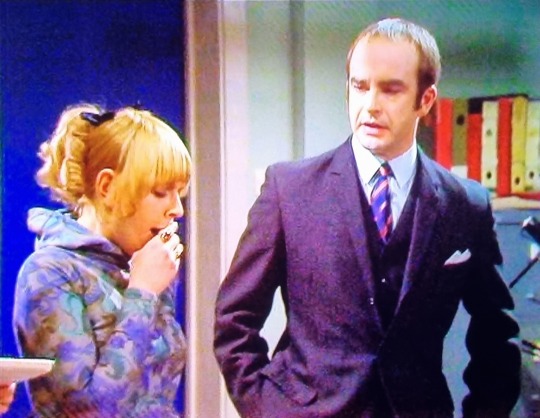
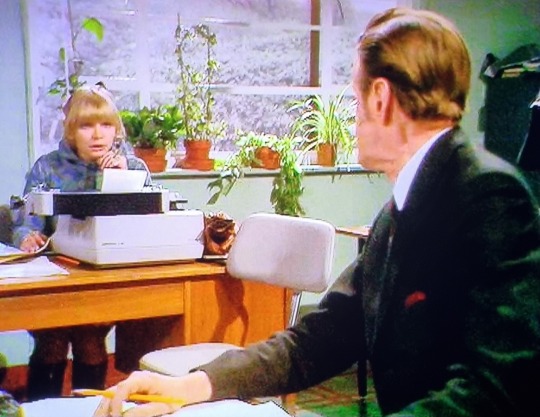
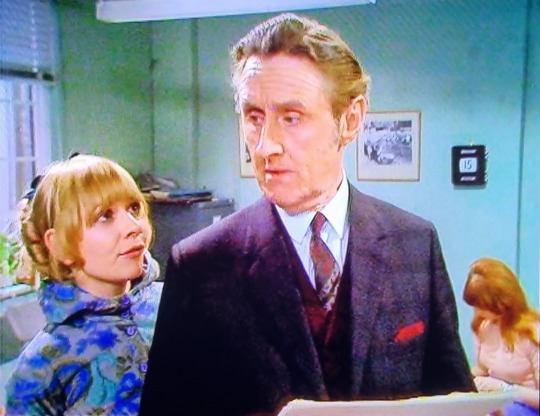
Katy Manning - in her first ever screen role, and credited as Katie - makes awful coffee and has a good nose at some industrial action, in Softly Softly: Task Force: Standing Orders (1.8, BBC, 1970)
#fave spotting#katy manning#jo grant#softly softly: task force#doctor who#classic doctor who#standing orders#alan plater#bbc#the awful coffee thing is referenced several times in dialogue for some reason‚ it isn't just me being a dick#katy's part here is fairly negligible at a glance‚ but this is a fascinating episode of SSTF. I've found this first series deeply uneven so#far‚ beginning with a couple of brilliant‚ razor sharp scripts from series creator Elwyn Jones‚ but followed by a few really duff#eps by Robert Barr‚ who seems to have seized the procedural aspect of the series and clung to it so his episodes depict fairly dull#routine work for the characters. my heart jumped‚ then‚ when the opening credits for this episode announced Alan Plater as the writer#Plater was truly one of our greatest screenwriters and deserves to be mentioned alongside Rosenthal and Potter (but rarely is‚ perhaps#because he contributed so much to genre work or bc he did so much freelance for other series like this‚ rather than concentrating on his#own original creations all the time). this is well before Beiderbecke made his name‚ but he was already an established writer and so#presumably well known for the socialist views that inform much of his work (even freelancing). doubly surprising then‚ considering this#episode follows on immediately from 1.7 The Aggro Boy‚ an Allan Prior script that's interesting as a document on attitudes and approaches#to football hooliganism in 1970‚ but which has a highly Conservative bent and contains dialogue which seems to support increased powers of#policing‚ the return of national service‚ and a general despair with 'modern society'. Prior's script couldn't be further from Plater's#beliefs‚ but to his credit this episode (concerning labour disputes and unofficial strikes) does its damndest to remain neutral (mostly#through the figure of Norman Bowler's Insp Hawkins who will not be drawn into taking sides). i suppose it's testament to Plater's#professionalism; he was after all a guest writer on a mildly conservative cop show‚ not to mention writing for the BBC (always at pains to#appear politically neutral). his characters are varied‚ with good and bad on both sides of the debate; there are bad managers and trouble#makers on the picket‚ as well as sympathetic bosses and earnest union men. if Plater does allow his leftwing bias to show (and it's only#briefly) it's in scenes where Hawkins is goaded by his superiors into betraying his own sympathies: something he explicitly refuses to do#so where does Katy come in? what does her character represent? if anything i think she represents the disinterested masses#the idle onlookers; her secretary character is not directly involved in the shop disputes and spends most of the episode watching the men#from the window with half curiosity and half boredom. and she does it superbly!
25 notes
·
View notes
Text
‘Ignore it. The man is clinically insane even by the standards of the teaching profession.’ -Mr. Carter, The Beiderbecke Connection (written by Alan Plater)
6 notes
·
View notes
Photo

The Sunday Mirror - September 26, 1965
Ex-RADA chief to join Epstein
Sunday Mirror Reporter
John Fernald, whose shock decision to quit as principal of the Royal Academy of Dramatic Art raised a storm earlier this year, has got a new job - with a rebel former pupil.
The pupil is Beatles manager Brian Epstein, who eight years ago walked out of RADA after only three terms because ‘I hated it.’
In London yesterday, Fernald, 59, signed - for an undisclosed fee - to direct one of the new plays which Epstein, 30, is to present in the West End this autumn.
Epstein said:
“As a student I know I failed John Fernald. But maybe I can make amends now.”
Fernald, who has been the academy’s principal for ten years, said: “Epstein showed great promise as a pupil. But I was sympathetic with his reasons for leaving and did not try to persuade him to stay on.”
Now Fernald begins casting for the play “A Smashing Day”, written by Alan Plater.
17 notes
·
View notes
Text

to passion! to paradise! to pain! tonight...alan handed us this Beautiful lizardhat as gomez and morticia on a silver plater. swanky
283 notes
·
View notes
Text
Love how the Baron Kite has the theme from Z-Cars programmed as Mr. Baxter's cell phone. Nerd.
1 note
·
View note
Text
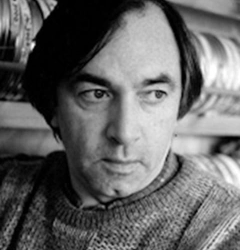


Happy Birthday Bill Forsyth the Scottish film director and screenwriter.
Born in Glasgow July 29th 1946 and educated at Knightswood School. On leaving aged 17, he answered an advertisement for a “Lad required for film company” and spent the next eight years helping make short documentary films.
Leaving documentary production in 1977, Forsyth wrote the scripts for Gregory’s Girl and That Sinking Feeling in the hope of breaking into feature films.
Obtaining finance, however, proved frustrating and problematic. The BFI Production Board rejected Gregory’s Girl three times. Forsyth later said, “I remember one torment of a meeting when I tried to explain that Gregory’s Girl was really a structuralist comedy… I suspect my script was too conventional although nobody actually told me as much.”.
That Sinking Feeling was eventually made in 1979 with amateur actors from the Glasgow Youth Theatre, including John Gordon Sinclair (who later took the lead in Gregory’s Girl , its tiny £5,000 budget was raised from a variety of sources.
Forsyth’s distinctive voice as writer-director is already apparent in this tale of a robbery of stainless steel sinks by a gang of unemployed Glasgow teenagers - intensely humanistic and humorous yet with an underlying seriousness of purpose. This ability to create a self-contained yet believable world with a keen sense of the absurd and bizarre in the everyday is perhaps only rivalled by the work of British television writer Alan Plater. The film opened to great popular and critical success at the Edinburgh and London Film Festivals but was unable to secure more widespread distribution.
Gregory’s Girl was Forsyth’s breakthrough film. This acutely observed story of adolescence and first love set in a Scottish new town was rapturously received by both critics and public alike. Forsyth’s reputation seemed to be secured by the success of his next venture, Local Hero, a first collaboration with producer David Puttnam.
In 1999 he made Gregory’s Two Girls as a sequel to Gregory’s Girl, with John Gordon Sinclair playing the same character, but it received mixed reviews.
Gregory's Girl, to me, is still a very funny film, but it feels dated, that's not to say that it hasn't stood the test of time with some folk, indeed The Glasgow Film Theatre (GFT) will show a 4k version of the 1980 cult classic on August 17th, which will be followed by a Q&A session with some of the cast including Gordon Sinclair(Gregory), Clare Grogan, tickets go on sale this Monday (31s) at 12 noon.
Last year the popular Scottish actor Peter Capaldi where he spoke of how Bill Forsyth saved him from living off pakora and lager after starring him in Scottish cult classic Local Hero. The Doctor Who and The Thick Of It star praised the Scots film director in an acceptance speech after receiving the Bafta Scotland Award for Outstanding Contribution to Film & Television on Sunday.
I love Capaldi's affection for our country, speaking to the audience while holding his Bafta, Capaldi said the award was “for getting lucky, and for being lucky enough to be born in Scotland”.
He said: “Forty years ago I was just up here (in Glasgow) as an art student, living off pakora and lager for breakfast.
“Bill Forsyth scooped me up and put me in Local Hero.
“It was an act of kindness and confidence that baffled me and much of the industry to this day, but I wouldn’t be here without him and nor would a lot of others.”
Capaldi landed this breakthrough film role aged 24 playing Danny Oldsen, a naive young oil industry executive, in the film.
6 notes
·
View notes
Text
For the love of jazz
The playwright Alan Plater drew on jazz to inspire and improve his own writing. Some notes on his book Doggin’ Around.

My son bought me a copy of Alan Plater’s memoir Doggin’ Around as a Father’s Day present. It’s a memoir rather than an autobiography because it looks at his life through the lens of his life-long relationship with jazz music. Plater was born in the north-east and brought up in Hull, and had a rich and distinguished writing career that started with Z-Carsin the early ‘60s and perhaps became most…
View On WordPress
0 notes
Photo

Archive Interview • MARK BABYCH • Blonde Bombshells of 1943 • 2007 Alan Plater’s drama about an all-women swing band in the Second World War began life as an award-winning TV film starring Judi Dench and Ian Holm.
#1943#Alan Plater#artistic director#Blonde Bombshells of 1943#Bolton#Derek Jacobi#Ian Holm#Judi Dench#Mark Babych#Octagon Theatre#Second World War#Tour
0 notes
Text
Adaptations of Anthony Trollope Novels
Below is a list of television adaptations of some of Anthony Trollope’s novels:

“The Pallisers” (1974) - Written by Simon Raven; starring Susan Hampshire, Philip Latham and Caroline Mortimer

“The Barchester Chronicles” (1982) - Directed by David Giles and written by Alan Plater; starring Donald Pleasance, Susan Hampshire, Geraldine McEwan and Alan Rickman.

“The Way We Live Now” (2001) - Directed by David Yates and written by Andrew Davies; starring David Suchet, Shirley Henderson and Matthew Macfadyen.

“He Knew He Was Right” (2004) - Directed by Tom Vaughan and written by Andrew Davies; starring Oliver Dimsdale, Laura Fraser and Bill Nighy.

“Doctor Thorne” (2016) - Directed by Niall MacCormick and written by Julian Fellowes; starring Tom Hollander, Stefanie Martini, Harry Richardson, Rebecca Front and Ian McShane.
#anthony trollope#bbc period drama#period drama#costume dramas#the pallisers#philip latham#susan hampshire#caroline mortimer#the barchester chronicles#donald pleasance#alan rickman#geraldine mcewan#the way we live now#david suchet#matthew macfadyen#shirley henderson#david yates#andrew davies#he knew he was right#oliver dimsdale#laura fraser#bill nighy#anna massey#doctor thorne#amazon prime#julian fellowes#tom hollander#stefanie martini#harry richardson#rebecca front
9 notes
·
View notes